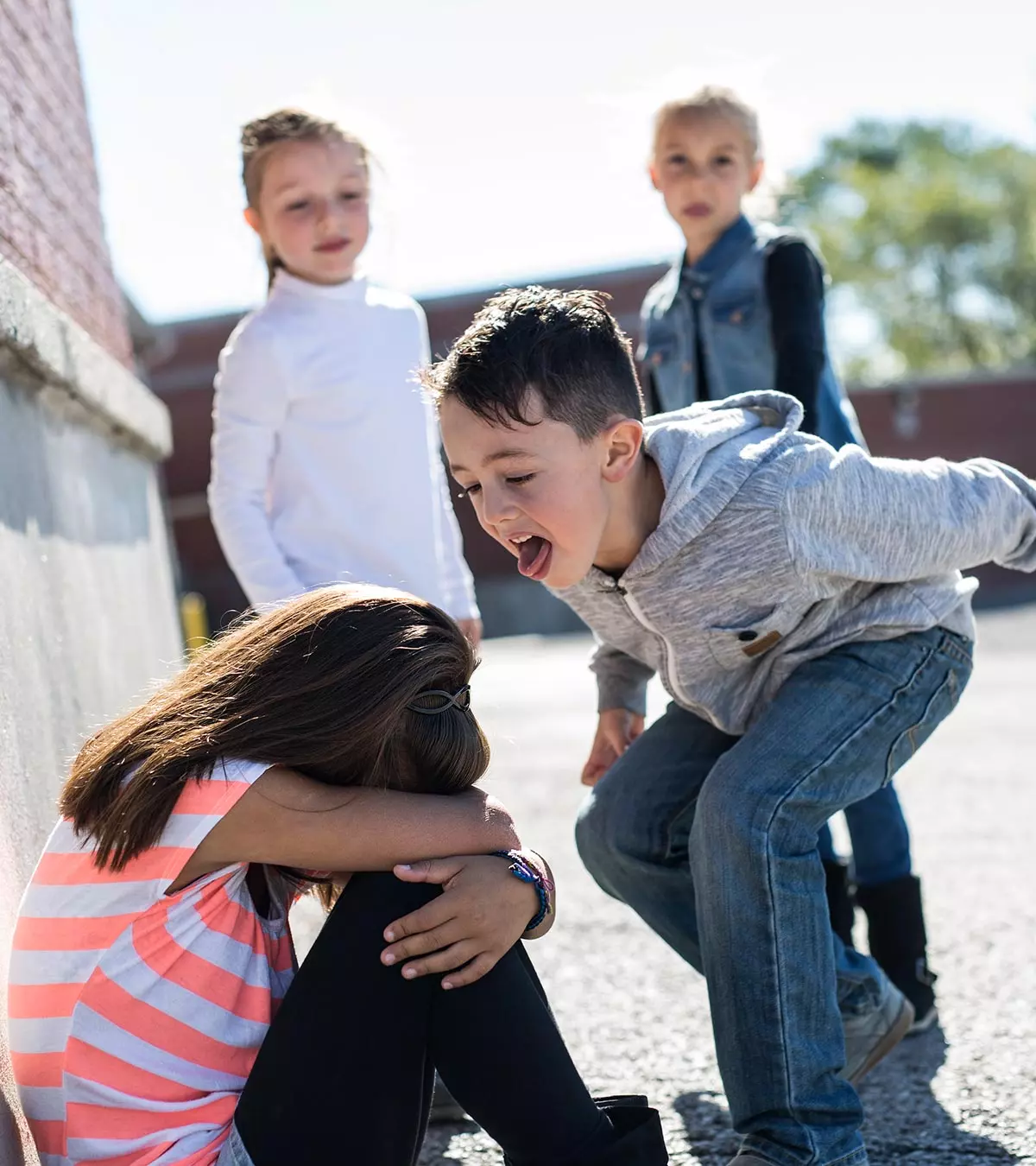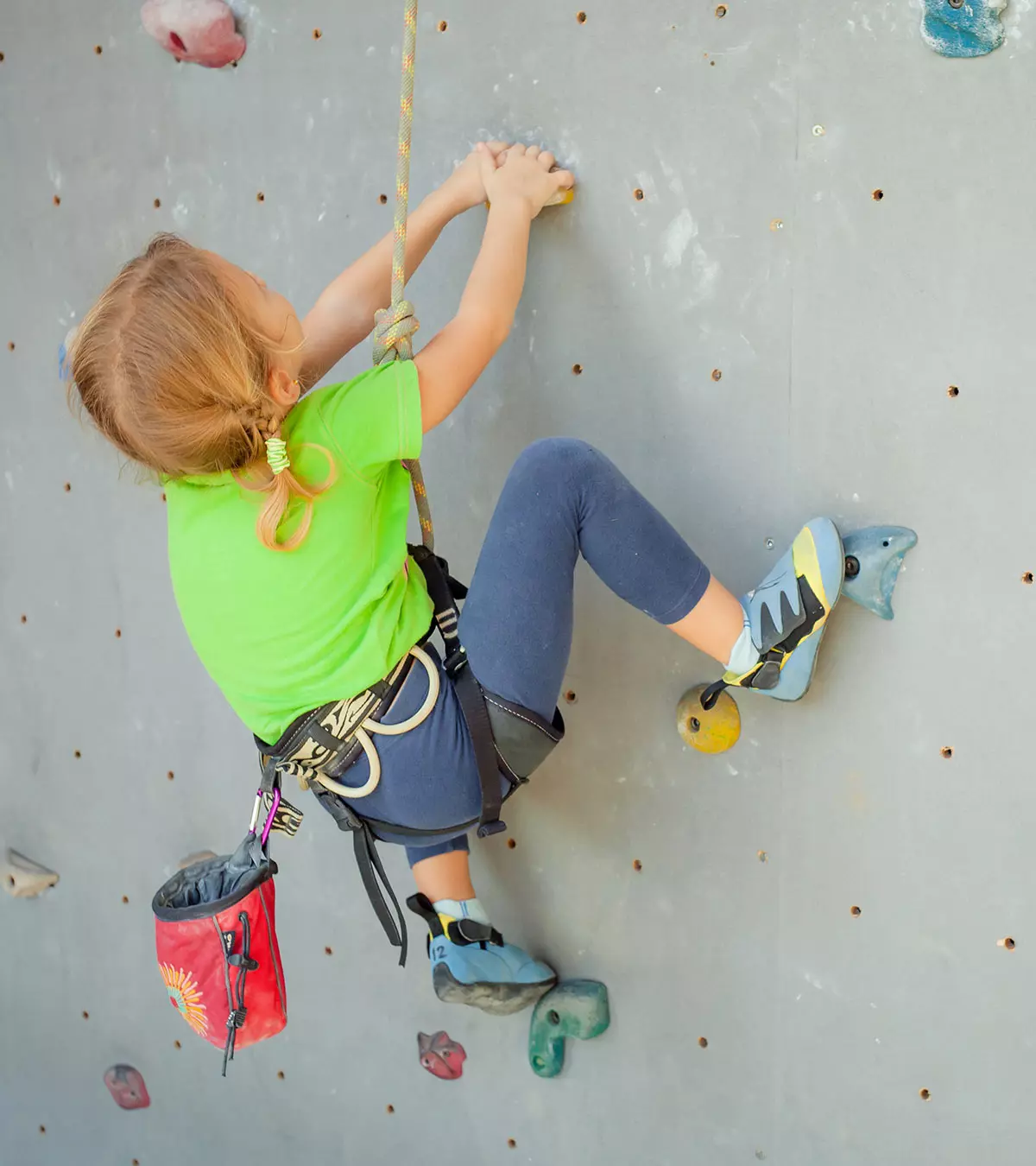

Image: iStock
Bullying in kids is a terrifying and terrible experience for them. According to some studies, it affects roughly 20% of students aged 12 to 18 in the US (1).

Bullying can affect victims in several ways, such as by substantially deteriorating their self-esteem. As a result of their experiences, many bullied children also develop serious psychological disorders. Therefore, it is critical to address and prevent the problem in its early phases before it has any long-term negative consequences on children.
This post covers several important points on bullying, including why it occurs, how to recognize the warning signs, and how to prevent or stop your child from being bullied.
What Is Bullying?
Bullying in kids is an act of aggression displayed by a child towards another child or other children (2). Bullies often use their superior physical strength, cleverness, or popularity to hurt another child in any way they can. The means to hurt include acts of physical assault, such as hitting, kicking, pushing, and tripping, and mental torture, such as name-calling, spreading rumors, shaming in class and in general.
Bullying is a cause of concern for all parties concerned, including the school and the parents of the bully and the bullied. Apart from physical and verbal bullying at school and other places, there is cyberbullying, which happens over emails, text messages, and comments and messages on social media. Some social media sites allow posting comments or other content anonymously, giving bullies a chance to harass others by posting nasty comments or sending unsavory messages.
Here are some common examples of bullying in kids.
- Teasing another child over and over again
- Ignoring a child and excluding them from play
- Saying nasty things about a child
- Calling names
- Spreading rumors about a child they don’t like
- Hitting, kicking, or pushing other children, or doing things that will hurt them, such as scratching them with sharp objects or pulling hair
- Taking someone’s things away
- Gesturing rudely or making rude facial expressions
- Eating the food from someone’s lunchbox so that they go hungry
- Posting nasty comments online or sending hateful text messages
- Uploading unwanted photographs on social media
Although bullying generally happens in a group, some bullies operate alone, too. If their friends disagree or protest, bullies are likely to treat them in the same way.
Most schools have strict rules against bullying. However, it is important for you as a parent to talk about bullying with your child, too.
Why Do Children Bully Others?
There are many reasons why a child can be a bully.
- Lack of attention: The most common reason for bullying is the lack of attention from a parent at home. They try to grab other people’s attention by bullying, and lash out to vent their frustrations. This mostly happens in homes where a child is neglected due to the arrival of a baby, an ongoing divorce, or a parent who is addicted to drugs or alcohol.
- Bullied by siblings: In some cases, if an older sibling is a bully, the younger sibling can become a bully, too. The older sibling may bully the younger sibling, who may later bully others at school.
- Parents may be bullies: Sometimes, the parents of bullies might be bullies themselves. They could shout at others unnecessarily, treat others disrespectfully, or talk about others disparagingly at home. Children of such parents might think it is normal to bully others and do the same at school and other public places. In such cases, the parents are unaware of how to manage their anger, and, consequently, the children cannot handle their anger, too.
- Impressing others: Some children bully to impress others and fit in with a group of friends. They bully to gain acceptance in a group or a social circle, which might consist of bullies.
- Lack of empathy: Many children, especially younger ones, do not understand the consequences and the overall impact of their actions. It is hard for them to comprehend the impact of bullying on someone’s feelings. The lack of empathy causes them to continue bullying rampantly (3).
What Are The Signs Of Bullying?
If your child does not tell you that they are being bullied, it is difficult to know whether they are experiencing it unless bullying causes physical injuries. Often, bullies instruct the child not to report anything to an adult and threaten them with dire consequences if they do. Unexplained physical bruises, cuts, and scratches in odd places are red flags that could indicate a bullying incident.
Some behavioral signs could also occur as a result of the psychological trauma caused by bullying. It might be difficult to tell immediately, but repeated observation could make bullying evident.
The following are the various physical and behavioral signs of bullying in children.
- Torn clothes
- Missing items
- Different behavior
- Not eating or sleeping properly
- Bedwetting
- Unexplained aches and pains, especially in the stomach
- Habit of making excuses
- Reluctance to go to school or participate in activities
- Keeps to themselves and doesn’t want to mingle
- Speaks of another child with fear
- Sudden drop in school performance
- Cries or gets angry in simple situations
It is usually difficult to notice signs of verbal or emotional abuse, but you can look for indicators, such as loss of self-esteem or any unusual behavior. In some cases, children even develop a stutter.
You should also check for signs that your child might display if they are the bully. If left unattended, child bullying can lead to many problems at both personal and professional levels. A child bully will not automatically confess that they are bullying others. You should stay vigilant to the signs that indicate your child is the bully.
The following signs could indicate that your child is a bully.
- Uses violence as a solution to basic problems
- Shows aggression towards adults and children alike
- Dominates others and tries to control situations
- Throws massive tantrums for small issues
- Gets easily frustrated
- Shows little or no sympathy to others
- Avoids certain situations where they cannot have the upper hand or cannot bully their way out
These signs are not always apparent. It is up to a child’s parents and teachers to remain alert and notice these signs early.
What Can You Do If Your Child Is Bullied?
Parents and other adults in close contact with children play an important role in reducing bullying. You have to keep your eyes open to notice the signs your child might display and take immediate steps. Talking to the school authorities could be a good first step, followed by consulting a pediatrician or a child counselor.
Here are some things you can do (4).
1. Listen
If your child tells you that they are being bullied, listen to them calmly and without judgment. Offer them comfort and support. Often, bullied children are scared, and if they are older, they feel embarrassed to admit to their parents or teachers that they are being bullied.
2. Explain
Often, children who are bullied put the blame on themselves. They believe that if they had looked different or had different mannerisms, they wouldn’t be bullied. They are often bullied into believing that if they tell someone, the bullying will worsen. They are also worried that their parents might ask them to stand up against the bully when they don’t want to.
Explain to your child that they have done the right thing by coming to you. Tell them that bullies will trouble them no matter what they do or how they look. Show them that they are not alone; there are many children and even adults who get bullied for no fault of theirs. Finally, explain to them that it is the bully who is wrong, not your child.
3. Reassure
Reassure your child that you have understood their problem, and you will now stand by their side to tackle this issue. Make plans with them as to how to address the bullying without making them feel guilty or cornered.
4. Report
Bullying commonly happens in schools where many children are together for long periods. Report the bullying and the perpetrator to someone responsible for the children at school, such as the principal, teacher, counselor, or nurse. Request them to keep a watch and prevent further occurrences. You can even talk with the bully’s parents, along with the school authorities.
5. Seek legal protection
Many schools have anti-bullying rules in place, and they run programs to instruct against unwanted behavior. All states have bullying laws and policies in place as well. Learn about these laws and rules. You can contact legal authorities in serious cases, such as when the bully threatens your child with physical harm.
What Advice Should You Give Your Child?
The bullied child might often not know how to react to bullying and the bully. Parents can step in and teach the child ways to handle bullying with minimal frustration and without any bitter retaliation.
Here are the ways your child can handle bullying (5):
1. Avoid the bully
If your child spots the bully, ask them to walk away. If your child spots the bully routinely while walking to school, ask them to use an alternative route to avoid the bully.
2. Use a buddy
Ask your child to take the help of their trusted friends. Make sure they have someone with them at all times, including when on the school bus or visiting the washroom. In general, tell your child to keep a buddy nearby wherever they are likely to encounter the bully. Let your child reciprocate the same to their friend.
3. Do not show anger
It is natural to get upset and retaliate. However, bullies thrive on such reactions. They feel more powerful as they have managed to anger their victim, and they try to provoke them more. The key here is to maintain composure even after severe taunting and keep a calm face. In situations where the child cannot walk away, ask them to follow calming techniques, such as counting up to ten or taking deep breaths. While laughing or smiling at the bully might provoke them, they can train themselves to keep their face calm until the bully loses interest and walks away.
4. Put on a brave face
Tell your child that they should maintain a calm demeanor and not show that they are affected by bullying on their face. Acting like they are uninterested, ignoring the hurtful comments, and texting on the cellphone while the bully is talking are some ways to show that the bully’s words aren’t affecting them. If possible, they can walk away from the scene.
5. Inform an adult
Many children think that complaining is bad. In some cases, the bully might have threatened your child with violence if they complain about bullying. In either case, tell your child that the bully is wrong and that your child must tell what is happening to an adult at the earliest. Early intervention by the school authorities is often helpful in curbing bullying.
What To Do If Your Child Is A Bully?
It is not only the bullied child who needs help; even the bully requires attention to correct their inappropriate behavior. If your child is a bully, it does not mean they are hopeless and there is no way to set things right. Proper guidance and adequate support can help transform the child’s demeanor.
Here are some things to do if your child is a bully.
1. Communicate
Ask your child the reason behind their behavior. If they are uncomfortable speaking to you, involve the school counselor or their favorite teacher in the conversation. Find out the reason they are acting out and try to understand their perspective.
2. Teach manners
Discuss each scenario with them and tell them the response you expect. For example, “During lunch, I want you to eat from your lunchbox/plate and not grab food from someone’s plate.” Such pointers can reinforce appropriate behavior.
3. Analyze your behavior
Think about your own behavior with your child and check whether it is appropriate. If you feel your behavior is the trigger for their actions, it is time to correct yourself. Keep tabs on your anger, the way you speak to others, and also keep an eye on how the child’s older siblings treat them.
4. Punish swiftly but justly
Let them know that there will be consequences for their actions and follow up on their wrongdoings. This method is particularly effective with preteens and teenagers. Taking away privileges in case of misbehavior could be a strong motive for good behavior.
5. Apologize
Saying sorry is very difficult. Your child might have undergone punishment and apologized to you, but you can take it further and ask them to apologize publicly before the class. They could even bake cookies for the whole class to make amends. This way, your child learns humility.
6. Monitor
Keep an eye on their activities even if they say they have stopped bullying. While physical or verbal bullying can be easily detected, cyberbullying can be more difficult to discover. Regularly check the electronic devices of your children. Many devices feature parental control options that let you restrict or remotely observe your child’s interaction with others.
7. Counsel
Counseling can help in cases where your child is unable to understand their faults despite repeated punishments or efforts of the parents or teachers. Find a counselor who specializes in counseling children who indulge in bullying. Regular counseling can gradually improve the child’s behavior and make them understand the negative effects of bullying.
8. Be open
Every child needs a parent with whom they can talk without fear of judgment. Try to be that parent. Listen to them and give them advice when required. If your child knows that they can always share their feelings with you, they may not develop pent-up emotions, which could ultimately lead to bullying.
Are Bullies Only Boys?
Many parents mistakenly think that bullies are only boys. However, it is not the case, and bullies can be of any gender. The precursor conditions that lead children to become bullies could affect any child. Therefore, parents must not ignore complaints of bullying from their child based on the gender of the bully.
Frequently Asked Questions
1. What are some programs to prevent bullying?
The following are some anti-bullying programs that aim to prevent and stop bullying (6):
- KiVa
- Olweus Bullying Prevention Program (OBPP)
- Second Step (Committee for Children)
- Friends
- Blueprints for Healthy School Development
- Friendly Schools
2. What makes an anti-bullying program effective?
The efficacy of an anti-bullying program depends on certain important factors, including:
- The inclusion of positive messages that encourage children to stand up for themselves and others
- Vigilance in looking out for bullying behaviors or activities to take an immediate step
- Promptness in dealing with any bullying activities and taking action
- Mindfulness while dealing with the complaints and concerns of the victims to provide the necessary protection
3. What is National Bullying Prevention Month?
October is celebrated as National Bullying Prevention Month. It started in 2006, aiming to raise awareness about bullying throughout the month (7).
It is critical to intervene whether your child is being bullied, is the bully, or is a bystander. A child might be a bully for a variety of reasons, including a lack of attention at home, being bullied by siblings and parents, a lack of empathy, or a desire to impress others. Thus, as a parent, make sure you tell your child that bullying, as well as helping and abetting it, is not acceptable. Alert your child to tell a trusted adult if they see someone being bullied at school or elsewhere. Also, ensure that children receive suitable direction and support to develop their personality.
Key Pointers
- Children may bully to seek attention, to impress others, or because they lack empathy.
- Sit down with your child, listen to them, and assure them of their safety if they’re being bullied.
- If your child is the bully, help them analyze their behavior, make them apologize, and monitor them.
- You may consult a counselor to assist your child with their troubles.
References
1. Facts About Bullying; U.S. Department of Health and Human Services
2. Bullying; CDC
3. Brigit Katz, My Child Is a Bully: What Should I Do?; ChildMind
4. Gail Saltz, How to Arm Your Child Against Bullying; ChildMind
5. How to Talk to Your Children About Bullying; UNICEF
6. Bullying prevention programmes; International Bullying prevention association
7. National Bullying prevention month; Youth.gov
Community Experiences
Join the conversation and become a part of our nurturing community! Share your stories, experiences, and insights to connect with fellow parents.
Read full bio of Shreshtha Dhar















